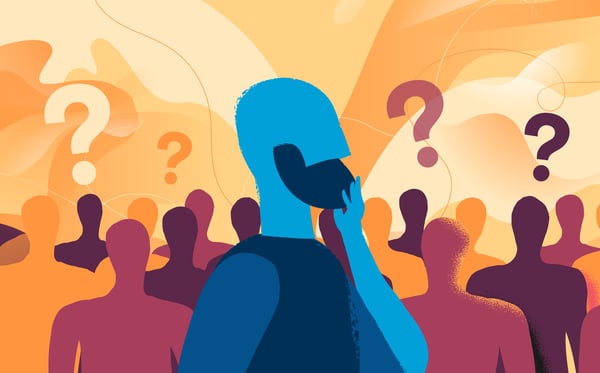“This person really upsets me!” is a very common expression; the anger emotion arises when something or someone gets us off balance. This change from our “not angry” or relaxed state to an “angry” state, is almost unnoticeable. Of course, we know when we are angry or very angry, but when we are aware, we are already beyond the transition point from relaxed to angry. The anger energy is so strong that when it happens, we don’t realize it,. It is like a shock in which we gain awareness once we are well into the anger and in the strongest cases not even in that moment but after it goes away.
Remote leadership is not a new thing but working from home, hybrid work and teams combining different working environments is still in constant evolution. Did you know that 1 out of 4 employees are already preparing to look for a new employment opportunity? And that almost half of the workers globally are considering leaving their current employers by the end of the year? (Source: McKinsey “It’s time for leaders to get real about hybrid” July 2021)
I think of all the times we are asked to share ideas, to help solve problems, to brainstorm new ideas, how many of those times do we hold ourselves back? How many of those times do we question our ideas? In a conversation with a friend, I asked her to describe a leader she really admired that was inspiring and supportive. She told me that she considered herself lucky because she did have an example for me. This leader would often sit with the team to brainstorm, and ask many questions to get her team to engage and just say whatever was on their mind. She would bring a blank canvas to a meeting and challenge her team to fill it. The idea was meant to inspire them and to challenge them to think outside of the box, but also to trust that she was listening. They would come up with the most amazing ideas that they could. The sky was the limit. And in our conversation my friend and I talked about the importance of encouraging and engaging our teams to want to share their ideas, their thoughts, to question processes and investigate possibilities. What would you do if you were given a blank canvas? How would you fill the space? What would you be willing to share? Express?
 “Esta persona me hace enojar” es una expresión común; el enojo surge cuando alguien nos altera. Esta transición de nuestro estado “no enojado” a “enojado” es casi imperceptible.
“Esta persona me hace enojar” es una expresión común; el enojo surge cuando alguien nos altera. Esta transición de nuestro estado “no enojado” a “enojado” es casi imperceptible.
 “No es personal” es una frase de uso común cuando estamos haciendo comentarios o compartiendo malas noticias con alguien, normalmente sobre algo relacionado con el trabajo. Sabemos que cuando nos tomamos las cosas personalmente, nuestro cerebro reacciona con nuestro mecanismo de defensa animal que nos protege inmediatamente de cualquier forma de agresión. Incluso si lo que percibimos como agresión son palabras, nuestro sistema genera adrenalina, envía sangre a nuestras extremidades y comienza nuestra respuesta de lucha o huida.
“No es personal” es una frase de uso común cuando estamos haciendo comentarios o compartiendo malas noticias con alguien, normalmente sobre algo relacionado con el trabajo. Sabemos que cuando nos tomamos las cosas personalmente, nuestro cerebro reacciona con nuestro mecanismo de defensa animal que nos protege inmediatamente de cualquier forma de agresión. Incluso si lo que percibimos como agresión son palabras, nuestro sistema genera adrenalina, envía sangre a nuestras extremidades y comienza nuestra respuesta de lucha o huida.
 El amor es un tema complejo cubierto por muchos poemas, libros, películas e historias. Sin duda, una parte intrínseca de nuestra vida, sin importar que trabajo, profesión o negocio tengamos. Siempre habrá un gran enfoque en nuestros seres queridos cuando se trata de nuestra lista de prioridades de tiempo y recursos. Podría ser tu esposo o esposa e hijos, podrían ser tus padres, tus amigos o incluso tu perro, pero a todos nos gusta amar y ser amados.
El amor es un tema complejo cubierto por muchos poemas, libros, películas e historias. Sin duda, una parte intrínseca de nuestra vida, sin importar que trabajo, profesión o negocio tengamos. Siempre habrá un gran enfoque en nuestros seres queridos cuando se trata de nuestra lista de prioridades de tiempo y recursos. Podría ser tu esposo o esposa e hijos, podrían ser tus padres, tus amigos o incluso tu perro, pero a todos nos gusta amar y ser amados.
 “It’s not personal”, is a commonly used phrase when we are either giving feedback or sharing bad news with someone about something at work. We know that when we take things personally our brain reacts with our animal defense mechanism immediately protecting us from any form of aggression. Even if what we perceive as aggression is words, our system generates adrenaline, sends blood to our limbs and starts up our fight or flight response.
“It’s not personal”, is a commonly used phrase when we are either giving feedback or sharing bad news with someone about something at work. We know that when we take things personally our brain reacts with our animal defense mechanism immediately protecting us from any form of aggression. Even if what we perceive as aggression is words, our system generates adrenaline, sends blood to our limbs and starts up our fight or flight response.
 Love is a complex topic covered by so many poems, books, movies and stories. No doubt an intrinsic part of our human life no matter what job, profession or business we have. There will always be a big focus on our loved ones when it comes to our priority list for time and resources. It could be your husband or wife and kids, it could be your parents, your friends or even your dog but we all love and like to be loved.
Love is a complex topic covered by so many poems, books, movies and stories. No doubt an intrinsic part of our human life no matter what job, profession or business we have. There will always be a big focus on our loved ones when it comes to our priority list for time and resources. It could be your husband or wife and kids, it could be your parents, your friends or even your dog but we all love and like to be loved.

“You must hear the very same thing over and over again” my coachee said, as we finished the session.I have to admit, he caught me off guard and caused me to pause. I think one of the things I have learned in my years of coaching through helping and challenging people in different situations, stages of their lives and parts of the world, is that there are no two people that share the exact same situation, thoughts or ideas.
Coaching has become a popular formula for leadership development in organizations and it is migrating from a private engagement for top level executives with their coaches to organizations looking to create a full coaching culture in their workplaces. But what does that mean? Having a coaching culture is not telling your managers to coach better or to practice active listening. Coaching is a personal transformation because it allows everyone to develop a better version of themselves with these principles:
